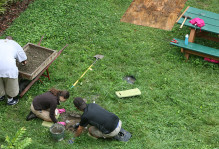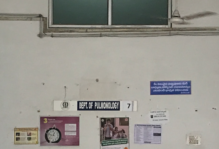The shifting pace of research: How students at SOMOS keep up
This is the fifth and final installment of a series highlighting exceptional student contributions to the Global Research Institute. Thank you for following along throughout April as we celebrated Undergraduate Research Month.
In January 2020, researchers at SOMOS—a division of GRI’s Ignite Lab that focuses on sustainable community development—traveled to Esfuerzo de Paraíso in the Dominican Republic. Through interviews with residents, the team investigated how inadequate trash collection in the area relates to perceptions of marginalization. The resulting paper was published in the International Journal of Environmental Research and Public Health, and lead author Madison Sasman ’22 broke down the findings and approach in a discussion with GRI.
Students at SOMOS make a concerted effort to pursue meaningful projects that can produce helpful outcomes in Esfuerzo de Paraíso, Sasman said. Because trash collection is not an isolated issue, the team explored it alongside several other topics, such as understandings of agency and relationship with the government.
“At the point that I joined the team, other members had formulated this question and saw that there was this gap, based on what the community had been expressing,” Sasman said. “It was a process that happened in multiple stages and took quite a while.”
After compiling interview questions and preparing for the trip, a group of SOMOS researchers was ready to travel to Esfuerzo de Paraíso.
“We went with the purpose of checking in with the community, seeing how they were doing, and then also administering this … interview,” Sasman said. “It’s nice to be able to do this in a setting that’s familiar to them, instead of in a situation where you’re bringing people into a laboratory or taking them out of where they’re used to. I hope for them it felt natural. It seemed like it.”
After transcribing the conversations, the team translated them to English and then coded responses into different thematic categories, Sasman said.
“It kept getting more and more specific until we could pull out salient ideas,” she said. “With that, we used all that information to write this paper, and we came to the conclusion that based on what the community had said, most people did not think the trash collection problem would be solved by taking action at the individual level. That was one of our big takeaways.”
After gathering the results, five students from SOMOS worked with Ignite Director Dr. Carrie Dolan to write an article detailing their results. In this phase, Sasman said, the team had to remain responsive while adapting to virtual circumstances.
“You can’t just work in your isolated sphere for two weeks and then assume that everyone knows you’re making progress,” she said. “The pandemic made it a little bit harder. There were lots of Zoom calls and texts back and forth. When we were communicating most fluidly, that’s when we were making the most progress.”
The pandemic has complicated the team’s next steps, too.
“We definitely want to disseminate these results,” Sasman said. “We have a responsibility to, first and foremost, but they also belong to the community because they came from the community. Normally, we would actually travel there and try to give verbal presentations with the results in a meeting with everyone, but we can’t do that right now, so we’re trying to pivot.”
In the meantime, however, some updates to trash collection practices have taken place and started to benefit the community.
“Because this process did take longer—partly due to the pandemic and partly because it’s a long-term thing—and because there were actually elections in the Dominican Republic soon after we left in January 2020, the issue of trash collection actually … has been somewhat resolved,” she said.
In contrast to burning trash in yards or putting it in unregulated areas, current practices involve more standard collection practices, she said.
“When we’ve WhatsApp-ed with community members and been in communication with them … there are actually services coming in fairly regularly to collect their trash,” she said. “It does make the dissemination of our findings a little bit more nuanced.”
Having to innovate due to unplanned circumstances, Sasman said, cultivated her versatility as a researcher.
“I’ve tried to embrace this in my time at SOMOS: You have a plan, and that is not the only plan that matters,” she said. “Since everything is shifting so often, the pace of research does not always match up with the pace of everyone else’s actions and plans. Because of that natural phenomenon, in my experience, you have to constantly be evaluating what you’re doing to make sure it’s still actually going to be helpful and have an impact that is valuable for the people that have the stake in it the most.”
As she considers other ways this experience has supported her growth, Sasman said efforts from her peers at SOMOS and the broader campus community make projects such as this possible.
“Everyone in some way contributed to this project,” she said. “We would not be able to do it without the whole group. I’m really grateful for the collaborative nature that SOMOS has and that we have, more generally, at William & Mary.”
Comments are currently closed. Comments are closed on all posts older than one year, and for those in our archive.



Thanks